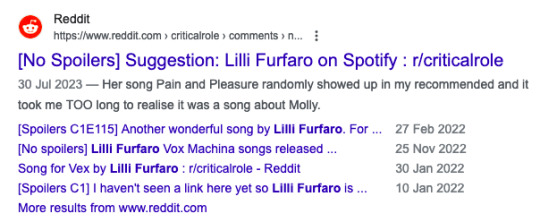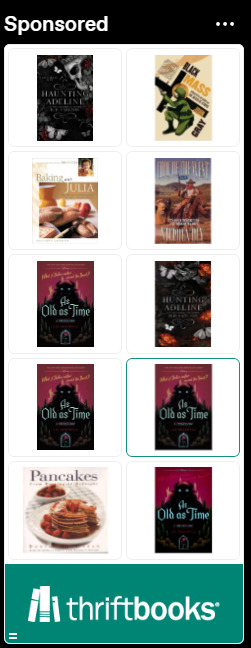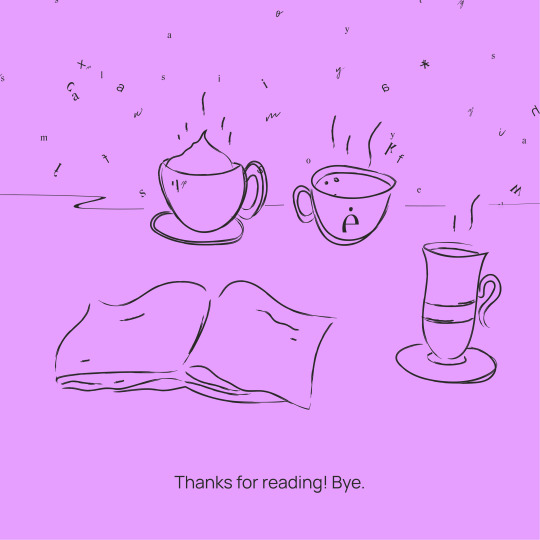#how google algorithm works
Explore tagged Tumblr posts
Text
Google’s Search Algorithm: How to Rank Higher On Google In 2023
In the ever-evolving landscape of digital marketing, staying on top of Google’s search algorithm updates is crucial for businesses aiming to secure higher rankings and increase their online visibility. Google's algorithm is designed to provide users with the most relevant and valuable search results based on various factors. As we venture into 2023, understanding the key strategies to rank higher on Google has become more important than ever.
Read more: Google’s Search Algorithm

#google algorithm#google's search algorithm#how google search engine works algorithm#how does google search algorithm work#how google algorithm works#how to rank higher on google#google seo update#google algorithm update
0 notes
Text

Google Docs spellcheck is becoming nigh unusable
#bro. that is not his name#why must everything be a learning algorithm#i want my spellcheck to be coded solely by human hands#okay i don't actually know how it works or how it used to work but#they add AI power and suddenly their program is dumb#my rambles#personal#ai#google
7 notes
·
View notes
Text
girl i have to give a presentation tomorrow morning abt how social media has decimated journalism and news media (duh) but google is literally so non-functional now that i can hardly find ANY sources about how disastrous pivot to video was
#like.. i lived thru it i listened to a podcast abt it last week#but i cant find anything anywhere#i found one academic article with old atlantic articles linked#and i can get around the paywall w internet archive etc#but i cant find anything else organically#its just insane. its just bonkers.#i was listening to someone talk abt how their old articles from 2014-2015 were like lost media now even to them#and YEAH#where the FUCK IS ALL THIS WRITING I REMEMBER READING#its like 'i remember the facebook algorithm did this and had this effect'#then i search for that specifically#and i find nothing#why doesnt google work anymore
3 notes
·
View notes
Text
a sequence of real events that occurred in my life over the last two days:
on my spotify 'for you indie and folk mix', the song tethering by lilli furfaro shows up (important note for if you click on the youtube link: the title on spotify is just 'tethering', not with that additional bit of the title that youtube has
i listen to the song at about 7:30am whilst drinking my coffee and marking (which is what i blame my inability to hear all the uh. hints in the lyrics on), and really like it
i immediately send it to one of my friends as 'a sweet song for your morning playlist' and add it to one of my many playlists for WIPs. in this context, I was like "oooh this would go perfectly in Vibe for this critical role fanfic I'm working on" and I add it to the playlist
my friend thinks the song is super sweet and chill. we don't discuss it anymore.
today i am on spotify and on that same playlist, another song by her, lessons, comes on. this time, i am attempting to avoid my marking, so i am looking at my screen, and when the song comes on, i realise the album is called vm, and i think. huh. that's funny.
the song continues. i am half paying attention. i'm like this is nice why is this. also. giving me critical role vibes. do i just have permanent critical role on the brain can i just find this in everything is this a me problem (very probable).
i google lilli furfaro on my work laptop, not really expecting anything apart from maybe finding out a different reason for an album to be called vm and evidence that i have a Problem with making everything about The Blorbos. as the line "i'm learning / that passing through fire can help things grow again", i see this very helpful search result:

i immediately combust, look up the lyrics to tethering and realise there were Many Signs that this is in fact actually a fan song i just. did not notice, and text my friend, who goes "oh my god the album art is just the letters VM how did we not notice"
(in our defence. it's folk music. i don't question the minimalist album decisions i just appreciate them.)
i learn that sometimes, making everything about The Blorbos is actually correct? i will take this lesson forward into my life and implement it regularly.
i also listen to lilli furfaro's entire discography, and my marking is abandoned for like an hour but it is worth it because the music is great. going to purchase it on bandcamp as soon as it's payday.
#text post#my post#2023 is an experience#for those of you who read this far#i am pleased to report that i DID eventually finish my marking#critical role#but not before one song nearly made me cry#i gotta emphasise how dramatic this all felt to me btw#like. every song is a blorbo song in my head#there is no limit to this#i have never been RIGHT before ACCIDENTALLY#like. stumbled across fan song via spotify#also is it filk do we still call it filk#the vibe feels pretty filk-y for me#what are the kids these days calling filk#my previous experience dates back to uh. wizard rock and chameleon circuit#anyway go stream lilli furfaro#i do have to say once i googled i realised i had heard of her briefly in the fandom but never listened to her work EVER#which i am honestly shocked it took me this long it's really fucking good#i guess i gotta thank the spotify algorithm for some things!
14 notes
·
View notes
Text
so we're going back to forums?
cause of the whole web2.0 is dying thing?
we're gonna swoop up all our mutuals and meet up in forums before they get lost in algorithms?
#anti algorithm#also if anyone can find me a tutorial on how to start a forum#now that fucking google doesnt work anymore#capitalism everybody
5 notes
·
View notes
Text
having an “I DECLARE BANKRUPTCY” moment
#not financially just mentally#i can’t open my laptop to work without feeling like a need a lobotomy#it’s not even just me lmfao like i’m watching a tower fall before my eyes#google search how to be an unemployed spiritual guru and still make $37/hour#maybe i need one of those walking pads so i can at least get my steps in while i put out fires#i don’t even know what the vision is anymore like my job description has been evolving every week for the past 2 months#i’m not professionally qualified for half of what i be doing 😭😭😭 i got where i am thru talent and audacity#but i ain’t got no training in search engine optimization LMFAO i hate the algorithm
1 note
·
View note
Text
Nice try, ads...

You're trying to sell me the items that I just sold to you
#been awhile folks#mostly been active on my sideblog <.<#good to see that there are still people reacting to my Halo: Reach feelings lol#also yes I'm aware of how algorithms work as far as ads are concerned#google saw me viewing/typing these titles and immediately decided that I must want to spend my money on them#anyway#that is all#will return as i see fit <3#ads#ads suck#ads on tumblr#ads on my dash#advertisements#tumblr ads#google ads
0 notes
Text
#solr#solr search#search#algorithm#technology#how it works#google search#google#trending#blog#newsletter
0 notes
Text
There's a boy, Eddie meets a boy, and it's mundane because they're boys and it's summer and they find each other like lonely boys in summer do. It shouldn't be the defining experience of Eddie's life, that summer, that boy. His memories are all sun drenched, tanned skin, minnow catching, swimming, camping under the stars, a fumbling, toasted-marshmallow-sticky first kiss. He grows up and still Eddie thinks there will never be anyone else like that boy.
---
There's this new teen soap schlock on the CW. It fills his social media algorithms with gossip and BTS footage and spoilers. He ignores every bit of it, so far from the target audience it's laughable.
Jeff, Gareth, and Freak get into it. At first, he takes this as a betrayal of the highest order, threatens to kill all their characters in their next dnd session, but they convince him to give it a shot.
It's airs Thursday nights and thank god Wayne is at work, he'd never live it down. He turns the TV on just in time for the cold open, and within ten seconds there's a beautiful man on screen. Chestnut hair, coiffed carefully back; down-turned, hazel puppy dog eyes; freckles and moles dotting his face and neck--Eddie would recognize them anywhere, spent hours mapping the constellations of them during their one magical summer.
He sinks to his knees in front of the TV--nose inches from the screen--watches the whole episode that way. For the entire hour, the only thing he sees is Steve Harrington.
Eddie doesn't move until after the credits have rolled. He can't believe that the boy he knew all those years ago is an actor on a popular show, that he'd just missed finding him, all this time.
Before he can talk himself out of it, he Googles, which is a mistake immediately, because the most popular pictures are from a GQ photoshoot where Steve is very wet and very shirtless, the amount of chest hair on display enough to kill a man. He forgets how to breathe for several seconds, before quickly scrolling away, which is also a mistake because it's how he learns that Steve 1) dated his castmate, Nancy Wheeler for several years before 2) she got caught cheating on him with another castmate, and 3) he's often seen out and about with his current on-screen girlfriend, Robin Buckley.
For his own sanity, he has to put his phone away. It isn't like he's going to see Steve ever again, obviously, so he needs to forget all this. Keep the memory of that summer safe.
---
It's late spring and Gareth invites them all to their favorite bar in Indianapolis. One of their friends from their Corroded Coffin days got a gig playing bass for some up and coming indie guy, tickets and drinks are comped. It's not their usual vibe, musically, but who is Eddie to say no to a free night out?
And, look, night of, the music isn't his vibe, but the place is packed and he's with his best friends, and the drinks are flowing, so even he finds himself swaying along to the whiney hipster shit coming from the stage.
Eventually, the lights go down for the headliner, and the crowd crushes forward in a way Eddie isn't used to in this bar. He lets himself be pushed forward, somehow ending up right in front of the stage.
When the lights go up, he stops breathing.
It's Steve.
Steve right there in front of him, guitar strapped across his midsection. He's wearing dorky little Ray-Ban sunglasses, but Eddie would know that hair, those moles, anywhere.
There's no way Steve will notice him, remember him, but it's enough to see him now, to hear his music. Eddie dances and smiles at the boy who got away. Maybe he'll mourn later for the distant hope he harbored deep within his heart. But, he thinks, this is enough.
Steve comes out for the encore, takes off the sunglasses, tosses them straight to Eddie, smiles big and genuine and familiar. His heart stops. It can't be real, it can't mean anything, but he's so elated that his soul might rise from his body.
The show ends, the buzz of it, of Steve, reverberating through Eddie as he makes his way back to the bar. It's crowded with people, but he slides through the bodies until he's at the front. Someone taps him on the back, and he thinks they're trying to get through, but when he turns it's Steve.
His smile is so beautiful, Eddie thinks that maybe he's dying.
"Eddie!" Steve says.
"Stevie!" He doesn't mean for the old nickname to come out, couldn't keep it in.
"You remember me!" Steve is beaming.
"I'd never forget you." He's smiling just as hard. "Can I buy you a drink?"
Steve's nose wrinkles. "I've got, like, fifty coming. We could go somewhere quiet to talk?"
He's never said yes to something so fast in his life.
They go back to the postage stamp sized green room, and he's surprised to see Robin Buckley there. His stomach shrivels for a second, but she stands and he sees the lesbian flag painted on the side of her Converse, the oversized vest she's wearing.
"You want me to skedaddle?" She asks. He loves her immediately.
"Do you mind?" Steve asks. Robin shakes her head.
"Nice to meet you, Eddie," she calls as she sails out the door.
"You told her about me?" He knows his smile is downright goofy.
Steve blushes. "Um, yeah. Maybe a little? Just that I met a boy from near here one summer. And, uh, maybe something about him being my first kiss?"
"Oh." Eddie thinks he might burst into flame. "I wasn't sure if--I didn't know if you'd remember."
"I'd never forget," Steve says.
"You got famous." Eddie says, which is dumb, but he doesn't know how to deal with Steve cherishing those childhood memories the same way he does.
"I guess I did." Steve looks down, hair tumbling around his face. "It's probably not what you were expecting."
"Did I expect to turn on the tv and see my first crush staring at me in HD? Not quite. But It was amazing. You're amazing."
"I'm on a CW show," Steve laughs.
"So?"
"I think maybe you're a little biased about your first crush."
"Are you saying that's a bad thing?" They're flirting, he thinks. Can't believe it's happening, that Steve might--
"Well, maybe, but only if you tell me you don't have a crush on me anymore."
"Are you kidding? I saw that GQ photoshoot."
Steve's laugh is loud and bright, like fireworks in Eddie's chest. They're closer now, sharing warmth, breath.
"I have some candids if you want to see."
"Don't tempt me with a good time, Stevie."
They're quiet for a second, Eddie a little breathless from how hard they're flirting, how right it feels.
"You were great out there," he says.
"Thanks." Steve smiles, bashful. "I know it's not your kind of music."
Eddie shrugs. "I like what you do."
"And to think, you've barely gotten a taste yet." Steve pauses for a beat, horror dawning on his face. "Oh, shit. That was--I'm sorry--I--Robin says I always come on too strong, and I promised I would play it cool, but--"
"You never have to play it cool with me," Eddie says, sincere through his laughter.
"This is fast, though, right? I mean. The second I saw you in the crowd, it--it confirmed everything I thought when we first met. That's--is that crazy?"
Eddie's smile is softer now. "Not at all." Gently, he cups Steve's cheek with his hand. "Can I kiss you?"
"Please," Steve breathes. "God, Eddie, please."
Their mouths meet and it starts out sweet and slow, but it's not childhood crushes anymore. Eddie's tongue teases at the seam of Steve's lips, which part for him like he's the only one in the world with the magic words.
It's sweeter than any marshmallow.
#steddie#steve x eddie#steve harrington#eddie munson#ficlet#fluff#childhood sweethearts#first kisses#mutual pining#love at first sight#reconnecting#sweet#regular guy eddie munson#famous steve harrington#steve has a djo arc#actor steve harrington#musician steve harrington#i malign both indie music and the cw here but don't hold it against me i love them#that whiny hipster shit is my shit#steve harrington has zero chill
1K notes
·
View notes
Text
"A funny thing happened on the way to the enshittocene: Google – which astonished the world when it reinvented search, blowing Altavista and Yahoo out of the water with a search tool that seemed magic – suddenly turned into a pile of shit.
Google's search results are terrible. The top of the page is dominated by spam, scams, and ads. A surprising number of those ads are scams. Sometimes, these are high-stakes scams played out by well-resourced adversaries who stand to make a fortune by tricking Google[...]
Google operates one of the world's most consequential security system – The Algorithm (TM) – in total secrecy. We're not allowed to know how Google's ranking system works, what its criteria are, or even when it changes: "If we told you that, the spammers would win."
Well, they kept it a secret, and the spammers won anyway.
...
Some of the biggest, most powerful, most trusted publications in the world have a side-hustle in quietly producing SEO-friendly "10 Best ___________ of 2024" lists: Rolling Stone, Forbes, US News and Report, CNN, New York Magazine, CNN, CNET, Tom's Guide, and more.
Google literally has one job: to detect this kind of thing and crush it. The deal we made with Google was, "You monopolize search and use your monopoly rents to ensure that we never, ever try another search engine. In return, you will somehow distinguish between low-effort, useless nonsense and good information. You promised us that if you got to be the unelected, permanent overlord of all information access, you would 'organize the world's information and make it universally accessible and useful.'"
They broke the deal." -Cory Doctorow
Read the whole article: https://pluralistic.net/2024/02/21/im-feeling-unlucky/#not-up-to-the-task
6K notes
·
View notes
Text
that's not strange tho? for most people, esp tumblr oldies, tagging is an organization system. tags are so you can find things later, and so if you want to see a lot of posts by one user in particular, you can easily go into your tag and locate them.
everyone talks about the strange people you run into as your post gets popular, but no one ever mentiones the most curious of them all – those who tag posts with the op's url
#it's why it makes me insane that people say the search function on this website doesn't work#it does you guys are all just algorithm brained and don't know how to use it#i can tell based on the way you talk about googling things sdfgsfd
26 notes
·
View notes
Text
"The first satellite in a constellation designed specifically to locate wildfires early and precisely anywhere on the planet has now reached Earth's orbit, and it could forever change how we tackle unplanned infernos.
The FireSat constellation, which will consist of more than 50 satellites when it goes live, is the first of its kind that's purpose-built to detect and track fires. It's an initiative launched by nonprofit Earth Fire Alliance, which includes Google and Silicon Valley-based space services startup Muon Space as partners, among others.
According to Google, current satellite systems rely on low-resolution imagery and cover a particular area only once every 12 hours to spot significantly large wildfires spanning a couple of acres. FireSat, on the other hand, will be able to detect wildfires as small as 270 sq ft (25 sq m) – the size of a classroom – and deliver high-resolution visual updates every 20 minutes.
The FireSat project has only been in the works for less than a year and a half. The satellites are fitted with custom six-band multispectral infrared cameras, designed to capture imagery suitable for machine learning algorithms to accurately identify wildfires – differentiating them from misleading objects like smokestacks.
These algorithms look at an image from a particular location, and compare it with the last 1,000 times it was captured by the satellite's camera to determine if what it's seeing is indeed a wildfire. AI technology in the FireSat system also helps predict how a fire might spread; that can help firefighters make better decisions about how to control the flames safely and effectively.
This could go a long way towards preventing the immense destruction of forest habitats and urban areas, and the displacement of residents caused by wildfires each year. For reference, the deadly wildfires that raged across Los Angeles in January were estimated to have cuased more than $250 billion in damages.
Muon is currently developing three more satellites, which are set to launch next year. The entire constellation should be in orbit by 2030.
The FireSat effort isn't the only project to watch for wildfires from orbit. OroraTech launched its first wildfire-detection satellite – FOREST-1 – in 2022, followed by one more in 2023 and another earlier this year. The company tells us that another eight are due to go up toward the end of March."
-via March 18, 2025
#wildfire#wildfires#la wildfires#los angeles#ai#artificial intelligence#machine learning#satellite#natural disasters#good news#hope
722 notes
·
View notes
Text

Each week (or so), we'll highlight the relevant (and sometimes rage-inducing) news adjacent to writing and freedom of expression. This week:
Inkitt’s AI-powered fiction factory
Inkitt started in the mid-2010s as a cozy platform where anyone could share their writing. Fast forward twenty twenty-fuckkkkk, and like most startups, it’s pivoted hard into AI-fueled content production with the soul of an algorithm.

Pictured: Inkitt preparing human-generated work for an AI-powered flume ride to The Unknown.
Here’s how it works: Inkitt monitors reader engagement with tracking software, then picks popular stories to publish on its premium app, Galatea. From there, stories can get spun into sequels, spinoffs, or adapted for GalateaTV… often with minimal author involvement. Authors get an undisclosed cut of revenue, but for most, it’s a fraction of what they’d earn with a traditional publisher (let alone self-publishing).
“'They prey on new writers who have no idea what they’re doing,' said the writer of one popular Galatea series."
Many, many authors have side-eyed or outright decried the platform as inherently predatory for years, due to nebulous payout promises. And much of the concern centers on contracts that don’t require authors’ consent for editorial changes or AI-generated “additions” to the original text.
Now, Inkitt has gone full DiSrUpTiOn, leaning heavily on generative AI to ghostwrite, edit, generate audiobook narration, and design covers, under the banner of “democratizing storytelling.” (AI? In my democratized storytelling platform? It’s more likely than you think.)

Pictured: Inkitt’s CEO looking at the most-read stories.
But Inkitt’s CEO doesn’t seem too concerned about what authors think: “His business model doesn’t need them.”

The company recently raised $37 million, with backers including former CEOs of Sony, Penguin, and HarperCollins, proving once again that publishing loves a disruptor… as long as it disrupts creatives, not capital. And more AI companies are mushrooming up to chase the same vision: “a vision of human-created art becoming the raw material for AI-powered, corporate-owned content-production machines—a scenario in which humans would play an ever-shrinking role.”
(Not to say we predicted this, but…)
Welcome to the creator-industrial complex.

Publishers to AI: Stop stealing our stuff (please?)
Major publishers—including The New York Times, The Washington Post, The Guardian, and Vox Media—have launched a "Support Responsible AI" campaign, urging the U.S. government to regulate AI's use of copyrighted content.
Like last month's campaigns by the Authors Guild and the UK's Society of Authors, there's a website where where you can (and should!) contact your representatives to say, “Hey, maybe stop letting billion-dollar tech giants strip-mine journalism.”
The campaign’s ads carry slogans like “Stop AI Theft” and “AI Steals From You Too” and call for legislation that would force AI companies to pay for the content they train on and clearly label AI-generated content with attribution. This follows lobbying by OpenAI and Google to make it legal to scrape and train on copyrighted material without consent.
The publishers assert they are not explicitly anti-AI, but advocate for a “fair” system that respects intellectual property and supports journalism.
But… awkward, The Washington Post—now owned by Jeff Bezos—has reportedly already struck a deal with OpenAI to license and summarize its content. So, mixed signals.
Still, as the campaign reminds us: “Stealing is un-American.”
(Unless it’s profitable.)

#WarForever
We at Ellipsus love a good meme-turned-megaproject. Back in January, the-app-formerly-known-as-Twitter user @lolt64 tweeted a cryptic line about "the frozen wastes of europa,” the earliest reference to the never-ending war on Jupiter’s icy moon.
A slew of bleak dispatches from weary, doomed soldiers entrenched on Europa’s ice fields snowballed (iceberged?) into a sprawling saga, yes-and-ing with fan art, vignettes, and memes under the hashtag #WarForever.
It’s not quite X’s answer to Goncharov: It turns out WarForever is some flavor of viral marketing for a tabletop RPG zine. But the internet ran with it anyway, with NASA playing the Scorcese of the stars.

In a digital hellworld increasingly dominated by AI slopification, data harvesting, and “content at scale,” projects like WarForever are a blessed reminder that creativity—actual, human creativity—perseveres.
Even on a frozen moon. Even here.

Let us know if you find something other writers should know about, (or join our Discord and share it there!)
- The Ellipsus Team xo

#ellipsus#writblr#writers on tumblr#writing#creative writing#anti ai#writing community#fanfic#fanfiction#fiction#inkitt#us politics
330 notes
·
View notes
Text
love conjeture, lh44 x reader
masterlist
pairing: lewis hamilton x mathematician!reader
summary: sometimes algorithms win championships, other times they help find love. (social media au)

mercedesamgf1

liked by yninmath, georgerussell63 and 879.301 others
mercedesamgf1 This year we want to give a special thank-you to Dr. Yn Ln! With the creation of her new algorithm focused on data analysis and her extensive collaboration this season our view in analytics evolved to unimaginable levels. We are forever grateful for her contributions and what they mean for the future of Formula 1. Thanks again Dr. Ln, and good luck with the thesis! 😎💻
tagged yninmath;
see all comments
yninmath thank you for the opportunity🫡💙 it was an honor to work alongside this great team
mercedesamgf1 👏💙
user1 omg work girlll!!
user2 just googled her and im going crazy like how do you have 3 phds at 27😭?
user3 graduated super early too shes kind of a genius lol
lewishamilton thank you miss yn💙
yninmath your welcome sir champion🥹
user4 ok this is cuteee
user5 you should be thanking him bffr
georgerussell63 Outstanding!🙌 Make sure to come back Dr. Yn
yninmath oh but the travelling😮💨
lewishamilton nah you’ll make it back
yninmath if you say so haha
yninmath

liked by lewishamilton and others
yninmath currently picking up trash couches, writing thesis and remembering the friends ive made along the way 🤓💘
on a serious note, if anyone is interested in reading about topology feel free to read my new paper abt it (link in bio #influencer)
tagged bestfriend, roscoelovescoco;
see all comments
roscoelovescoco working’s hard🐾😵💫
yninmath or hardly working🤔
bestfriend surprised the couch didnt bring rats or something
yninmath no rats or fleas!!! its been a great couch #trashcouch #luckygirls
bestfriend please never use # again
user1 great paper dr yn😍 is there any way I could get your paper on the hodge conjeture for academical porpouses? magazines are too expensive, help a girl out🙏
yninmath dm me girl that should be free so make sure your class gets it too
user2 dr yn youre saving the nyu maths class of 25’🫡
lewishamilton no rest on break miss yn?
yninmath you know me already haha💞
user3 suspicious…
user4 what? they cant be just friends?
user5 I thought she worked for merecedes, what is this?
user6 she was only there to develop part of her thesis tho still won them another championship
liked by lewishamilton
f1paddockgossip

liked by pierregasly and 903.443 others
f1paddockgossip BREAKING! Lewis Hamilton was caught while vacationing in France with mathematician and Mercedes’ collaborator Dr. Yn Ln. The pair are rumored to be in a months-long relationship already, starting in the middle of last season.
see all comments
user1 NOOOOO
user2 isnt she like way younger than him? weird
user3 shes literally a grown woman lol she can be with whoever she pleases
user4 no cause they actually look really cute🥹 so happy for them
user5 right! she seems super nice
user6 i just know that man is confused everytime she talks numbers lmao the curse of dating a stem girlie
lewishamilton

liked by yninmath, f1 and 3.478.139 others
lewishamilton congrats on the finished thesis miss yn😉💙 love you
comments have been limited
yninmath love u and ty for the championship😘 would have failed otherwise
lewishamilton 😂😂
lewishamilton anything for my girl
yninmath 🥹
yninmath

liked by mercedesamgf1, lewishamilton and others
yninmath you best believe he sat on the #trashcouch #dearlordwhenigettoheaven
comments have been limited
bestfriend did it have fleas lewishamilton?
lewishamilton no but I was worried
yninmath booo tomatoes
bestfriend just buy a new one please
yninmath i believe in sustentability🫡🍃
lewishamilton there has to be a limit
lewishamilton ❤️❤️
yninmath love you sm
liked by lewishamilton
——
a/n: ty for reading and i hope you enjoyed🩷 maybe ill be writing more for different drivers soon, so if anyone is interesed keep that in mind!
1K notes
·
View notes
Text
I just can't fathom how any artist could possibly support proposals to expand the scope of copyright so that stylistically similar works can be held to infringe as a defence against AI art. The content ID algorithms of major media platforms are implemented in a way which already establishes a de facto presumption that the sum total of humanity's creative output is owned by approximately six major media corporations, placing the burden of proof on the individual artist to demonstrate otherwise, and they've managed to do this in a legislative environment in which only directly derivative works may infringe. Can you imagine what copyright strikes on YouTube would look like if the RIAA and its cronies were obliged merely to assert that your work exhibits stylistic similarity to literally any piece of content that they own? Do you imagine that Google wouldn't cheerfully help them do it?
4K notes
·
View notes
Note
Do you have any sources on Black masculinity, femeninity and androgyny? Like what hairstyles and clothes are viewed as what? Trying to google it for the sake of intentional character design did not bear useful results.
That's because the internet believes the queer experience to be White, and centers it in a search algorithm as such!
You're gonna have to read things like this to understand the culture to better understand what to look for; you're going to have to look into real queer Black people's experiences and pictures. Because I don't think looking it up like a list for dressing dolls is gonna work, both for considering the humanity of the people you're looking into and for style ideas.
A lot of Black queer fashion and expression I find are from following people who post their looks. @blackqueernotables posts Black queer creatives all the time; you can get names of people and see how they dress and what they do. Get on IG and start finding blogs of Black queer fashionistas! The WNBA- I've been finding and saving pictures. A lot of those Black women range from Baddie Femme to Gorgeously Masc.
Knowing identity terms will help you- looking up "Black stud outfits" got me lists on Pinterest (got studsinsuits as an IG page too!) "Black femme gay men" also got me Pinterest lists and articles. Get specific!
199 notes
·
View notes